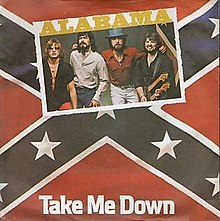| "Take Me Down" | ||||
|---|---|---|---|---|
 | ||||
| Single by Alabama | ||||
| from the album Mountain Music | ||||
| B-side | "Lovin' You Is Killin' Me" | |||
| Released | May 6, 1982 (U.S.) | |||
| Recorded | 1981 | |||
| Genre | Country rock [1] | |||
| Length | 3:43 (single edit) 4:53 (album version) | |||
| Label | RCA Nashville 13210 | |||
| Songwriter(s) | Mark Gray, J.P. Pennington | |||
| Producer(s) | Harold Shedd and Alabama | |||
| Alabama singles chronology | ||||
| ||||
"Take Me Down" is a song recorded by American country music band Alabama. It was released in May 1982 as the second single from Alabama's album Mountain Music . [2]
Contents
Written by Exile band members Mark Gray and J.P. Pennington, the song was originally recorded by Exile in 1980. The Exile version was released as a single, but failed to become a major hit, although it reached number 102 on the US Bubbling Under chart [3] and number 11 in South Africa. [4]
However, it was not until Alabama released the song that it was the group's seventh number one on the country chart. [5] In addition to its success on the country charts, the song fared modestly well on pop radio, reaching No. 18 on the Billboard Hot 100. [6]